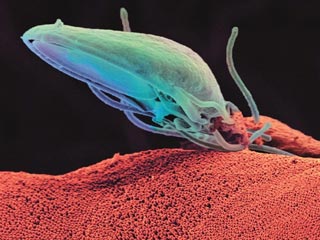

Parasites are microorganisms
Parasites are microorganisms that live off of other organisms, or hosts, to survive. Some parasites don’t affect the host. Others grow, reproduce, or give off toxins that make the host sick resulting in a parasitic infection.
Parasitic infections are a large problem in tropical and subtropical regions. Malaria is one of the deadliest diseases caused by a parasite. There are also a number of parasitic infections that can occur in the U.S. Trichomoniasis, giardiasis, cryptosporidiosis, and toxoplamosis are the most common such infections that occur in the U.S.
More content here
Types of Parasitic Infections
Parasitic infections can be caused by three types of organisms: protozoa, helminths, and ectoparasites. Protozoa are single-celled organisms that can live and multiply inside of humans. Some infections caused by protozoa include giardiasis. This is a serious infection that can happen from drinking water infected with the protozoa. Helminths are multi-celled organisms that can live alone or in humans. These are commonly known as worms and include flatworms, tapeworms, ringworms, and roundworms. Ectoparasites are multi-celled organisms that live in or feed off of the skin of humans, such as mosquitos, fleas, ticks, and mites.
Causes
Parasitic infections can be spread in a number of ways. They can be spread through contaminated water, waste, fecal matter, blood, and through food that has been mishandled or undercooked. It can also be passed through sexual contact. Some infections are spread because an insect acts as a vector, or carrier, of the disease and transmits it while feeding on the host. Malaria, which is spread by mosquitos, is one such example.
Who Is at Risk?
Anyone can get a parasitic infection. However, some people are at greater risk than others. Because many parasites thrive in tropical or subtropical regions where it is warm and moist, people who travel to these regions are at increased risk for contracting parasitic infections. Sub-Saharan Africa is particularly prone to parasitic infections.
People with compromised immune systems or those who already have an illness are at risk for infection as well. People without a clean supply of water are also at risk for contracting a Giardia infection. People who swim in lakes, rivers, and ponds and ingest the water are also at risk.
Cats transmit toxoplasmosis (a type of protozoa), which is a very harmful infection for pregnant women. If you have a cat and are pregnant, avoid cleaning the litter box or coming into contact with cat feces.
Childcare workers who come into contact with feces on a regular basis are also at risk of parasitic infection.
What Are the Symptoms?
Because there are many types of parasitic infections, the symptoms can vary. Most parasitic infections cause gastrointestinal symptoms. Symptoms by infection type include:
- Trichomoniasis: This sexually transmitted disease caused by a parasite often has no symptoms. Itching, redness, irritation, and an unusual discharge in the genital area are some symptoms.
- Giardiasis: Diarrhea, gas, upset stomach, greasy stools, and dehydration.
- Cryptosporidiosis: Stomach cramps or pain, dehydration, nausea, vomiting, fever, and weight loss.
- Toxoplamosis: Flu-like symptoms, pain or swollen lymph nodes, and muscle aches or pains that last for over a month.
How Is it Diagnosed?
Parasitic infections can be diagnosed in a number of ways. In a fecal exam, also called a stool exam or an ova parasite test, your stool is collected and analyzed to check for parasite eggs. An endoscopy or colonoscopy is also sometimes used if the stool exam is inconclusive. In an endoscopy or colonoscopy, a tube with a camera on the end is placed into your mouth or rectum. It is then passed through your digestive system so that your doctor can examine your intestines.
In some cases, a blood test can reveal if your infection is caused by a parasite. In extreme cases, x-rays, magnetic resonance imaging (MRI), and computerized axial tomography (CAT) scans can help identify if parasitic infections have caused lesions, or injury to your organs.
How Is it Treated?
Not every parasitic infection has a treatment, and some infections can recur. Trichomoniasis can be treated with antibiotics. Giardiasis and cryptosporidiosis can also be treated with medications. Toxoplamosis is usually not treated with a medication unless it is severe and prolonged. You should discuss the best treatment options with your health care provider. In some cases, your doctor may prescribe or recommend a medication to relieve diarrhea. Because diarrhea often leads to dehydration, be sure to drink plenty of fluids if you have an infection.
How Can Parasitic Infections be Prevented?
There are several ways you can protect yourself against parasitic infections:
- Drink clean, bottled water when traveling
- If you are pregnant, avoid cat litter and feces
- Practice safe sex
- Wash your hands, especially when coming into contact with contaminated food, water, and feces
- Cook food to recommended temperatures and practice good hand hygiene
- Avoid swallowing water in lakes, streams, or ponds
Related Articles

